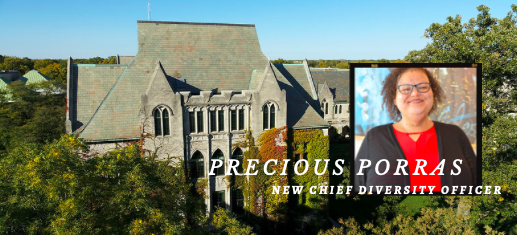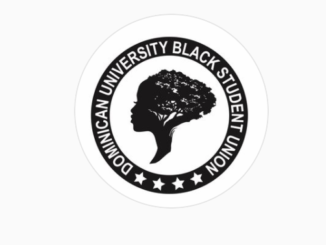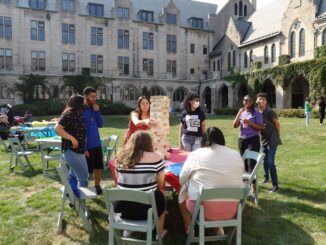
By Azhley Rodriguez
Dominican University has a new Chief Diversity Officer who will begin work on March 15. Precious Porras is coming to Dominican from the University of Kansas, where she has been assistant vice provost for equity and inclusion since 2018.
Porras said she has found her “dream job” at Dominican and hopes to do real work to combat racial injustice. She said she was attracted to Dominican’s need to embrace social justice and liberation.
Porras said it was crucial to see that Dominican was “living into” those beliefs instead of doing “just a service level commitment.”
“It’s ingrained to who we are as an institution and I want to be part of an institution that strives to do those things,” she said.
Porras’ philosophy for her new role on campus is that “social justice is a daily process of pushing yourself to refrain from participating from systems of oppression and pushing others to do the same,” which is a quote by Annice Fisher that she finds inspirational in her everyday life.
One obstacle Porras has noticed and is eager to work on is that like any other system of higher education, Dominican has marginalized people who aspire to make changes to their campus and often don’t see much progress.
Porras said she plans to advocate for students to speak up about their experiences being part of marginalized groups. She hopes to work not only for faculty, but for the students.
“I know I can’t make everybody happy,” she said. “But I want to ensure for the folks who are frustrated with their experience, that I’m able to create some sort of action in response to the things they want and need.”
Porras has a bachelor’s degree in psychology and sociology from Northwest Missouri State University, a master’s degree in counseling from Emporia State University, and her doctorate degree in educational leadership and policy studies from the University of Kansas. Porras began her career at Kansas as a retention specialist in the Office of Multicultural Affairs in 2005.
She is also a new mom, a lover of books, Netflix, dogs and TikTok. Now she is eager to get to campus and begin her role as the new CDO.
Porras follows Sheila Radford-Hill, who became Dominican’s first CDO in 2015 and became the university’s Title IX coordinator, dealing with issues based on sexual assault, domestic violence, and worked to prevent instances of discrimination and harassment at Dominican.
In Radford-Hill’s time at Dominican, she organized workshops on culturally responsive teaching and built a foundation that encourages change on campus for future CDO’s at Dominican. She described her time on campus to be, “an opportunity to support some of the best students in the entire world.”
“It was that diversity and hunger for knowledge in students that made Dominican a cauldron that could prepare us for lifelong learning,” she said.
The search that led to Porras began in September with a search committee of professors, administrators, an undergraduate student and a graduate student.
“What was important for us was that the new CDO could take the foundation that Sheila Radford-Hill has already established, and continue to move it forward,” Roberta McMahon, executive director of human resources, said. “To make sure that we’re advancing our DEI (Diversity, Equity, and Inclusion) initiatives.”
More than 70 people applied; 10 finalists were chosen for interviews that were held through Zoom. From those 10 candidates, three were chosen for full day campus interviews where “everyone in the community was invited to participate in.” Students also had a special session with the candidates and were given the opportunity to ask them questions.
Social work professor Leticia Villarreal Sosa served on the committee as well. She had hoped to find a CDO who was able to “address issues of race and equity from a more systemic perspective. Someone who understood there needed to be structural and systemic changes” and believes Porras is the best choice for Dominican.
After the interview process, the search committee was then able to give President Carroll their recommendations.
“It was a process where everyone felt their voices were included,” Villarreal Sosa said. “We were able to talk very openly about the strengths and weaknesses of various candidates.”



